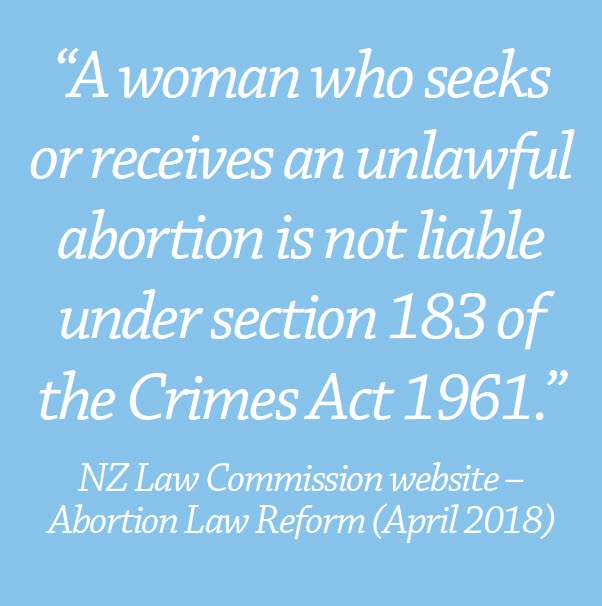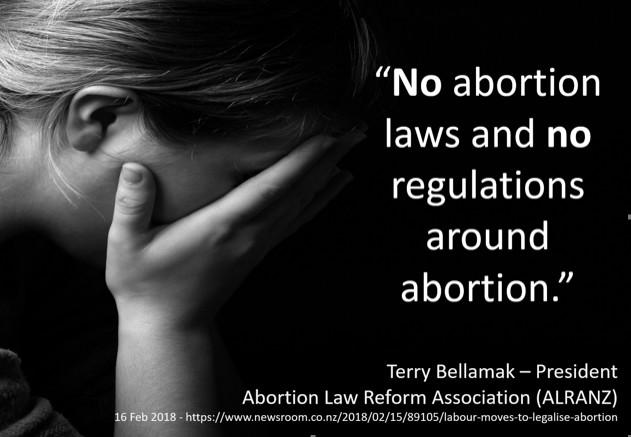Jacqui de Ruiter: Where are the women in abortion law-reform discussion?
 NZ Herald 16 April 2018
NZ Herald 16 April 2018
Family First Comment: Superb commentary:
“Terry Bellamak, national president of ALRANZ Abortion Rights Aotearoa, outlined its hopes for the commission in a column for the Herald of April 6. She made no mention of women – those who have an unplanned pregnancy and are worried about the effects pregnancy and a baby will have on their jobs, family and finances or their ability to cope in an often-difficult world, those in violent, abusive relationships, and those who feel like cattle shunted through abortion services, the post-abortive women who are hurting, physically, mentally, and emotionally.
And that’s to say nothing of the unborn women who lose their lives to abortion.”
Chooselife.org.nz/review
Justice Minister Andrew Little, directed by Prime Minister Jacinda Ardern, has tasked the Law Commission with making recommendations to the Government on how it may treat abortion as a health issue instead of a criminal one. The commission is also to review the statutory grounds for abortion and the process for receiving one, and to consult health professionals and the public. And they only have eight months to do it.
Terry Bellamak, national president of ALRANZ Abortion Rights Aotearoa, outlined its hopes for the commission in a column for the Herald of April 6. She made no mention of women – those who have an unplanned pregnancy and are worried about the effects pregnancy and a baby will have on their jobs, family and finances or their ability to cope in an often-difficult world, those in violent, abusive relationships, and those who feel like cattle shunted through abortion services, the post-abortive women who are hurting, physically, mentally, and emotionally.
And that’s to say nothing of the unborn women who lose their lives to abortion.
The law makes it a crime to perform an illegal abortion, which is one done by someone not registered to perform one, or done outside a licensed facility, or performed for a reason other than to protect the woman’s physical or mental health, or due to “foetal abnormality”. Women are not made criminals, doctors and others endangering women are.
This law, devised in the 1970s, leaves a lot to be desired. In the years since its passage we have learned more about fetal development, the realities of abortion as practised here and the effects that can extend years beyond the procedure. The law takes none of this into account. It protects women from unscrupulous and dangerous practices but does little to enhance their well-being.
Ultrasound technology and biological science have improved hugely since the 1970s. We now know a baby’s heart starts beating at five weeks, at nine weeks her basic physiology is formed and by 15 weeks she responds to light outside the womb. There is no doubt this is a new and unique life, just one at a fetal stage of development. Abortion ends this life.
When our current law was devised, a royal commission told the Government to tread carefully because it involved ending a life. After 40 years of legal abortion, we now know it does much more.
Some women may find relief in their abortions and recover quickly. But many suffer. They can experience pain or have complications that leave them infertile, suffer mental and emotional issues, mourn the child, even become suicidal.
These experiences might be exacerbated if the woman felt pressured or coerced into having the abortion. There can be pressure from abusive partners, family, or employers. But a woman can also feel indirect pressure from finances, social pressure, or just as a result of being in the stressful situation of being pregnant unexpectedly and not knowing where to seek help.
Too often the law allows abortion to be sold to women as a problem solver. It tells them their abusive relationships, mental-health struggles, financial issues, and stress will go away. But life is more complicated than that. Abortion can leave more problems than it solves.
Pregnant women deserve to know exactly what abortion entails, all of its possible risks and complications, and the other options available.
Should they opt for an abortion, they deserve compassion and care, and to be supported in recovery.
If there’s going to be a conversation about abortion, let it be open and honest. Let’s not rush it or keep it behind closed doors. And let’s not forget about the women.
http://www.nzherald.co.nz/nz/news/article.cfm?c_id=1&objectid=12033145






